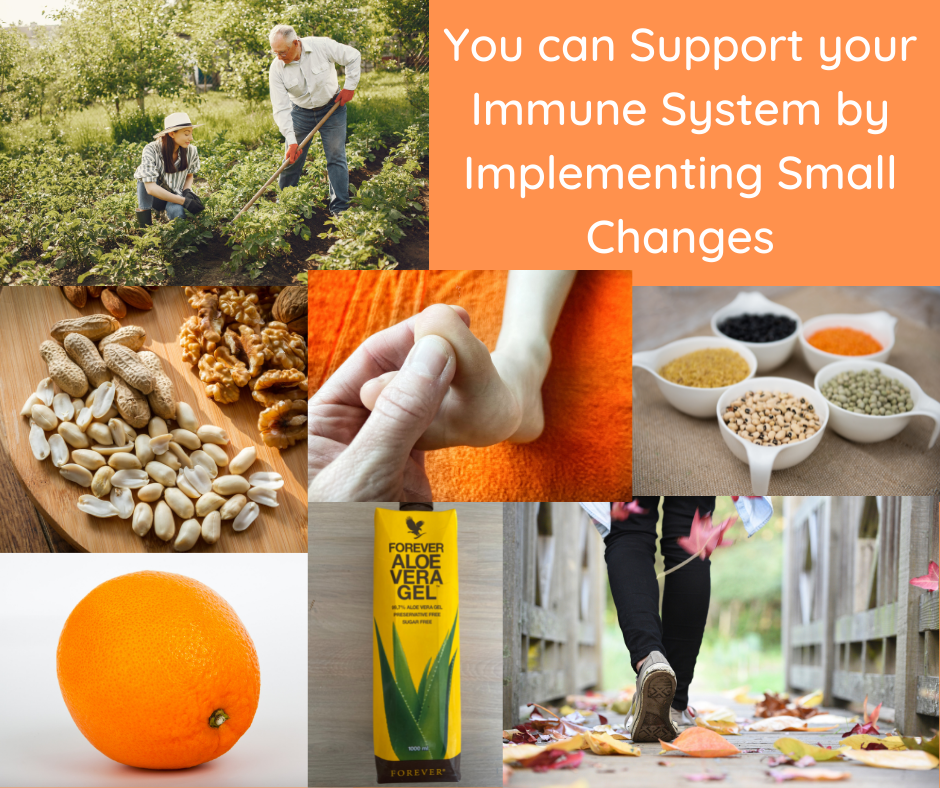
In this blog I focus on how you can support your immune system by implementing small changes.
The Role of the Immune System
The role of your immune system is to protect you from illness and infections to keep you feeling healthy. It is your natural immune barriers including the skin, hairs, mucous membranes (which protects our internal organs), tears, ear wax and stomach acid which are the first line of defence. It is their job to respond by fighting against foreign bodies. We are born with a certain amount of immunity. Overtime the body begins to develop antibodies to protect you from picking up every illness or infection.
As humans it is inevitable that we will pick up illnesses or infection. However, we generally recover quickly and can then continue to resume our daily activities.
When your immune system is not working efficiently you may:
- Have frequent illness and/or infections
- Take a long time to recover from these illness/infections
- Feel high levels of stress or anxiety over a period of time
- Struggle with digestive issues and have IBS, constipation and/or diarrhoea
- Feel constantly tired – physically and mentally
If the above points apply to you, it’s time to take positive steps to looking after your immune system. If you are concerned please consult your GP to discuss possible reasons for how you are feeling.
How can you support your immune system?
Daily Physical Activity
Take part in moderate physical activity (raising your heart rate) for between 30-60-minutes ideally each day. If you can aim for around 10,000 steps per day this includes housework, gardening, walking, cycling, swimming. Remember to build-up slowly if you are currently inactive.
Sleep
Having between 7-9-hours sleep each night is needed the optimum needed to maintain a healthy immune system. Meanwhile if you struggle to get a good nights sleep, completing this self-care hand reflexology routine every evening before bedtime to improve your quality of sleep.
Alcohol
Avoid binge drinking as this can supress your immune system. Stick to the recommend daily limits (2-3 units per day for women, 3-4 units for men). Have a minimum of 2-3 alcohol free days.
Stress
Long-term stress or trauma can de-regulate your immune system and can lead to chronic illness. Now is a good time to review your stress levels and address your work-life balance. What changes can you make? What do you have in place already to manage your stress?
There are many ways you can manage your stress, below are a few simple ways to get you started:
- Participate in low impact exercise such as Yoga, Pilates (video’s can be found on YouTube). Completing short, regular sessions are a great way to relax and reduce your stress levels.
- Have regular ‘me time’ by having a massage, reflexology, aromatherapy, hypnotherapy or reiki. Not only are these are very relaxing for the body and mind but they help to improve blood circulation and fight infection. If you are struggling to lower your stress levels, try this self-care foot reflexology https://youtu.be/qiuZb8tnUSc
- Deep breathing techniques are easy to implement at anytime. They are a great way to slow down your breathing and allow you to regain focus. Click here for an example of a deep breathing exercise.
Did you know that short-term stress could help increase our white blood cells and boost our immune system. One way to do this is to have a 30-second cold shower a day!
Nutrition
Have you ever completed a food diary; do you know what foods are in your diet?
Eating the right foods can be hugely beneficial for our immune system. In order for it to function efficiently it requires enough of the right nutrients! Consider what’s in your diet and make small changes by:
- Minimising processed foods, white starch, sugar, caffeine, alcohol.
- Increasing your vegetable intake. It is now recommended you eat 10 portions a day and include lots of colourful vegetables.
- Including 2-3 portions of fruit per day. Eating fruits such as oranges and sweet peppers can increase your vitamin C intake.
- Including foods such as cereals, pulses, nuts, wholegrain pasta, lentils (high in fibre). Meat, cheese, seeds (zinc) peas, yogurt (vitamin B and fish (Vitamin B12) into your diet.
- Taking vitamin D supplements. Our main source of vitamin D comes from the sun. As there is very little Vitamin D found in the food we eat, taking a supplement during the winter months is a great alternative to boost your immune system.
Forever Aloe Vera Gel
The Aloe vera gel is rich in nutrients and contains vitamin C. These are needed to support your gastrointestinal health, digestion and immunity to promote health and wellbeing. This drinking gel is as close to the real thing as you can get, boasting 99.7% inner leaf aloe gel. It is a great way to support the normal functioning of your immune system. To find out more about the aloe vera gel click here.
Summary:
You can support your immune system by implementing these small changes. Be realistic in your actions and choices, do not change your diet, lifestyle, physical activity all at once. Set yourself realistic goals and implement them one step at a time and take note of any changes you notice. Making these small changes can really help you to stay fit and healthy and keep those illness away! If you would like to know more how reflexology can help support your immune system or you have any other questions please feel free to contact me on 07889137168 or email at nicola@refoxology.co.uk.
